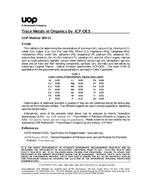Description
This method is for determining the concentrations of aluminum (Al), calcium (Ca), chromium (Cr), cobalt (Co), copper (Cu), iron (Fe), lead (Pb), lithium (Li), magnesium (Mg), manganese (Mn), molybdenum (Mo), nickel (Ni), palladium (Pd), phosphorus (P), platinum (Pt), potassium (K), sodium (Na), strontium, (Sr), tin (Sn), titanium (Ti), vanadium (V), and zinc (Zn) in organic matrices such as crude petroleum, asphalts, vacuum tower bottoms, vacuum gas oils, atmospheric gas oils, diesel and jet fuels and their blending components, pyrolysis oils, and fatty acid derivatives by Inductively Coupled Plasma – Optical Emission Spectrometry (ICP-OES). The lower limits of quantitation for the above elements, except palladium, are listed in Table 1 (see Note).
Determination of additional elements is possible if they are not volatilized during the ashing step and do not form insoluble sulfates. Two different reagents are used in sample preparation, depending upon the sample matrix.
Alternatively, some of the elements listed above may be analyzed by Atomic Absorption Spectroscopy (AAS). See UOP Method 391, “Trace Metals in Petroleum Products or Organics by AAS,” for specific metals and their range of quantitation. Metals known to be non-volatile may be analyzed by UOP Method 407, “Trace Metals in Organics by Dry Ashing – ICP-OES.”
Product Details
- Published:
- 02/25/2015
- Number of Pages:
- 13
- File Size:
- 1 file , 310 KB
